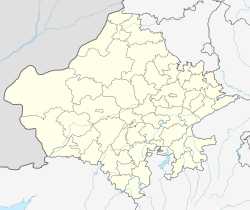
Jodhpur is the second-largest city of the north-western Indian state of Rajasthan after its capital Jaipur. As of 2011, the city has a population of 1.03 million. It serves as the administrative headquarters of the Jodhpur district and Jodhpur division. It is historic capital of the Kingdom of Marwar, founded in 1459 by Rao Jodha, a Rajput chief of the Rathore clan. On 11 Aug, 1947 four days prior to the Indian independence, Maharaja Hanwant Singh, the last ruler of Jodhpur state signed the Instrument of Accession and merged his state in Union of India. On March 30, 1949, it became part of the newly formed state of Rajasthan, which was created after merging the states of the erstwhile Rajputana Agency.

Marwar is a region of western Rajasthan state in North Western India. It lies partly in the Thar Desert. The word 'maru' is Sanskrit for desert. In Rajasthani languages, "wad" means a protected area. English translation of the word 'marwar' is the region protected by desert.

The Bishnoi Panth, also spelled as Vishnoi Panth, is Panth found in the Western Thar Desert and northern states of India. It have a set of 29 Niyamas (principles/commandments) given by Guru Jambheshwar (1451–1536). As of 2010, there are an estimated 600,000 followers of Bishnoi Panth residing in north and central India. Shree Guru Jambheshwar founded the sect at Samrathal Dhora in 1485 and his teachings, comprising 120 shabads, are known as Shabadwani. He preached for the next 51 years, travelling across India. The preaching of Guru Jambhoji inspires his followers as well as environmental protectors. Bishnoi sect admitted members from a variety of communities including Jats, Banias, Charans, Rajputs, and Brahmins.
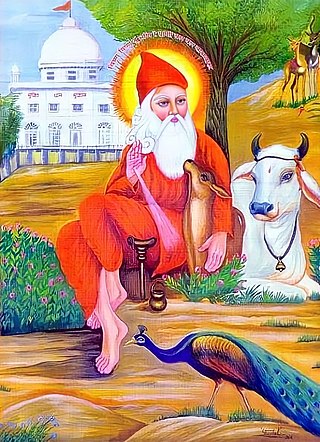
Guru Jambheshwar, also known as Guru Jambhoji, (1451–1536) was the founder of the Bishnoi Panth, a Hindu subsect of Vaishnavism.

Ajit Singh Rathore was the ruler of Marwar region in the present-day Rajasthan and the son of Jaswant Singh Rathore.
Jaswantpura is a tehsil in the Jalore district of Rajasthan, India. It is the headquarters of Panchayat Samiti (block) and a part of the Jaswantpura subdivision; before 1947, it was the headquarters of the Pargana. The village was declared a tehsil in the Rajasthan budget 2012–13, and is named after the ruler of Marwar, Jodhpur: Maharaja Jaswant Singh
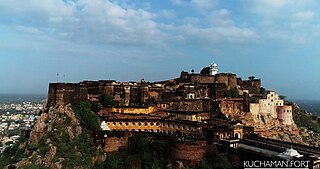
Kuchaman CityHindi pronunciation:[/ˌkuːtʃəˈmɑːnˈsɪti/] is a Municipal Council and District Headquarters of Didwana-Kuchaman District located in west-central Rajasthan, India. It is the largest city of newly Kuchaman district. The Didwana-Kuchaman district was carved out from the Nagaur District as the 38th District of the state of Rajasthan on 4 August 2023.
Tibbi is a town and one of the seven tehsil headquarters of Hanumangarh district of Rajasthan state in India. It is nearby Hanumangarh city. It is at the junction of Haryana, Punjab, and Rajasthan states. The total population 8GGR Tibbi as of 2011 is 11,553.

Kingdom of Marwar, also known as the Jodhpur State under the British, was a kingdom in the Marwar region from 1243 to 1818 and a princely state under British rule from 1818 to 1947. It was established in Pali by Rao Siha, possibly a migrant Gahadavala noble, in 1243. His successors continued to struggle against regional powers for domination and 9 out of 15 rulers till 1438 died in combat. In 1395, its capital was changed to Mandore by Rao Chunda of Mandore and to Jodhpur in 1459 by Rao Jodha.
Jojawar is a village located in Marwar Junction tehsil of Pali District in Rajasthan State, India. The mountains of the Aravalli Range are very near to this village. Jojawar is the location of the Jawahar Navodaya Vidyalaya school for Pali District, located about 1.5 km away on the Marwar Junction road.
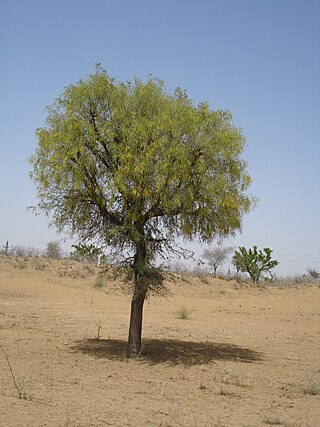
Prosopis cineraria, also known as ghaf, is a species of flowering tree in the pea family, Fabaceae. It is native to arid portions of Western Asia and the Indian Subcontinent, including Afghanistan, Bahrain, Iran, India, Oman, Pakistan, Saudi Arabia, the United Arab Emirates, and Yemen. Its leaves are bipinnate. It can survive extreme drought. It is an established introduced species in parts of Southeast Asia, including Indonesia.
Maroth is a village located in Nawa, Nagaur district, in the state of Rajasthan, India. The area surrounding the village is named Gaurati, which means "The Land of Gaurs".

Abhai Singh Rathore was an 18th-century Indian Raja of the Kingdom of Marwar (Jodhpur).

Bakht Singh or Bakhat Singh was an 18th-century Indian Raja of the Rathore Clan. Born in 1706, he ruled over various domains in the Jodhpur and Marwar states and was a major political force during his life.
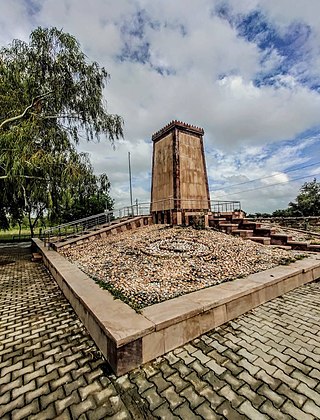
The Khejarli massacre occurred in September 1730 in Northern India, when 363 Bishnois were killed while trying to peacefully protect a grove of Khejri trees. The soldiers were sent by the Maharaja of Marwar, Abhai Singh to cut the trees in the village of Khejarli to provide wood for a new palace. The killings were carried out on the orders of his minister Giridhar Bhandari. The effort had a long term impact on environmental advocacy, and the massacre later became known as a precursor to the 20th century Chipko movement. Due to the sacrifice of the protesters, the ruler took back his earlier order of felling trees.

Mukam is a village, and most sacred site of Mukam Mukti Dham temple of Bishnoi community, located on Bikaner-Jodhpur State Highway 20 about 10 mi (16.09 km) from Nokha and 40 mi (64.37 km) from Bikaner in Bikaner district in the Indian state of Rajasthan.
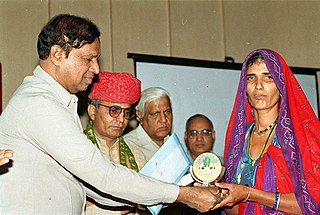
The Amrita Devi Bishnoi Wildlife Protection Award is a national award instituted by the government of India for wildlife conservation. The award is in the remembrance of Amrita Devi Bishnoi (Beniwal), who was killed in the 1730 Khejarli massacre while trying to protect a grove of Khejri trees in Khejarli, Rajasthan.

Maharaja Gaj Singh was the ruler of the Kingdom of Bikaner between 1746 and 1787. During this period, the Kingdom was a vassal state of the Mughal empire.
Amrita Devi Beniwal was an environmentalist and martyr from the Bishnoi community of Khejarli, Jodhpur district, Rajasthan, India. She is known for her role in the conservation of the Khejri trees, which are considered sacred by the Bishnoi community. She was killed, along with her three daughters, in the Khejarli massacre, after protesting the felling of trees by Maharaja Abhay Singh of Marwar.

